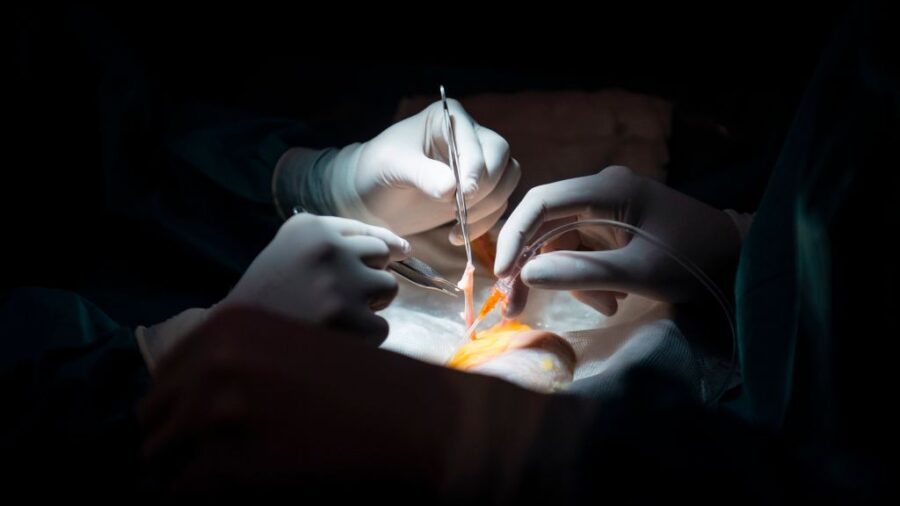Transplant experts report a surge in people canceling their organ donor registrations, shaken by reporting about a Kentucky man who, mistakenly declared dead after a drug overdose, almost had his organs removed in 2021—and subsequent witness testimonies.
While the case remains under investigation, no surgery took place, and the man ultimately recovered. But the story prompted many to reconsider their donor registrations at home and abroad.
In an interview with NPR, staff at Baptist Health Hospital in Richmond, Kentucky, said the presumed deceased Anthony Thomas “TJ” Hoover II woke up in the operating room just as doctors had begun to do a cardiac catheterization, a procedure to see whether his heart would be viable for donation.
Natasha Miller, one of the medical crew, told NPR that Hoover was “moving, thrashing around on the bed … he was crying visibly.”
The medical team was stunned, and the surgeon shut down the procedure. Miller said case coordinator Nyckoletta Martin—an employee of a Kentucky organ donation organization who’s since resigned—called her supervisor for advice. Allegedly, the supervisor ordered her to find “another doctor to do it.”
Martin said several of the crew that witnessed Hoover come back from the dead needed therapy afterward. “It took a toll on a lot of people, especially me,” she told NPR.
The Association of Organ Procurement Organizations (AOPO) responded to NPR’s reporting in an October 21 statement, urging the public to “exercise restraint in drawing conclusions” concerning the integrity of transplant organizations.
“OPOs are heavily regulated by federal authorities and staff are thoroughly trained to respect and protect the dignity of donors and their families. The organ donation process is designed to ensure that all stakeholders have a role in holding each other accountable at every stage, upholding the highest ethical standards,” the AOPO said, while also expressing its qualms about the Hoover case.
“The individuals making these claims waited three years to report them, a troubling and substantial delay that runs counter to OPO requirements, which call on staff to immediately report any perceived irregularities at the time they occur.”
However, during a congressional hearing held on September 11, four witnesses testified under oath that OPOs hasten death in order to harvest organs. No evidence was provided at the time to substantiate those claims.
The murderous accusations were denounced in a September 27 open letter signed by more than 1,100 professionals in organ donation and transplant, as well as physicians, patients, and donor families.
“Spreading misinformation based on conspiracy theories and hearsay is disturbing in any setting but is particularly dangerous during a Congressional hearing on organ donation and transplantation,” the letter read.
“Doing so, can cost lives by decreasing the number of people willing to register as donors.”
Dead or Alive?
Murderous accusations aside, the Hoover case does raise questions about the procedures to determine a patient’s death and what to do if anyone has a reason for doubt.
The law stipulates that doctors or staff involved with organ donation or transplants are banned from declaring a person dead—one doctors caring for patients can do so.
The crucial thing is ensuring that “all doctors are doing the right tests, and doing them well,” said Dr. Daniel Sulmasy, a Georgetown University bioethicist.
Currently, the Hoover case is still under investigation by the Oversight and Investigations Subcommittee of the House Energy and Commerce Committee—the federal agency that regulates the U.S. transplant system.
The Kentucky attorney general’s office said it is “reviewing the facts to identify an appropriate response.”
Backlash
Following reports of the Hoover case and testimonies at the congressional hearing, the number of registered organ donors has declined.
Donate Life America found an average of 170 people a day removed themselves from the national donor registry in the week following media coverage of the allegations—10 times more than the same week in 2023.
That doesn’t include emailed removal requests or state registries, another way people can volunteer to become a donor when they eventually die.
The Hoover case made the news in France, leading to a similar public response.
“Organ donation is based on public trust,” said AOPA President Dorrie Dils. When eroded, “it takes years to regain.”
What If Something Goes Wrong?
Procedures prescribe that the donor agency and transplant surgeons arriving to retrieve organs must check records of how death was determined. If anyone, be they donor hospital employees, donor agency staff, or surgeons, sees anything concerning, they are supposed to speak up immediately.
“This is extremely rare,” Dr. Ginny Bumgardner, an Ohio State University transplant surgeon who also leads the American Society of Transplant Surgeons, said of the Kentucky case.
If any sign of life is detected in the operating rooms, “the whole process stops” and independent doctors are called to verify whether the person really is dead, Bumgardner said. She added that she’s never seen a case in her 30-year career where the original death declaration was wrong.
Georgetown’s Sulmasy agreed problems are rare, but remarked that there’s wide variation among hospitals in what tests they perform to determine if someone’s brain-dead, and whether they’re a potential organ donor or not.
Doctors are debating whether to add additional test requirements.
Stricter criteria could “assure the public that we have done enormous due diligence before we determine that somebody’s dead,” Sulmasy said. It could help “to get people to stop ripping up their organ donor cards.”
The Associated Press contributed to this article.

